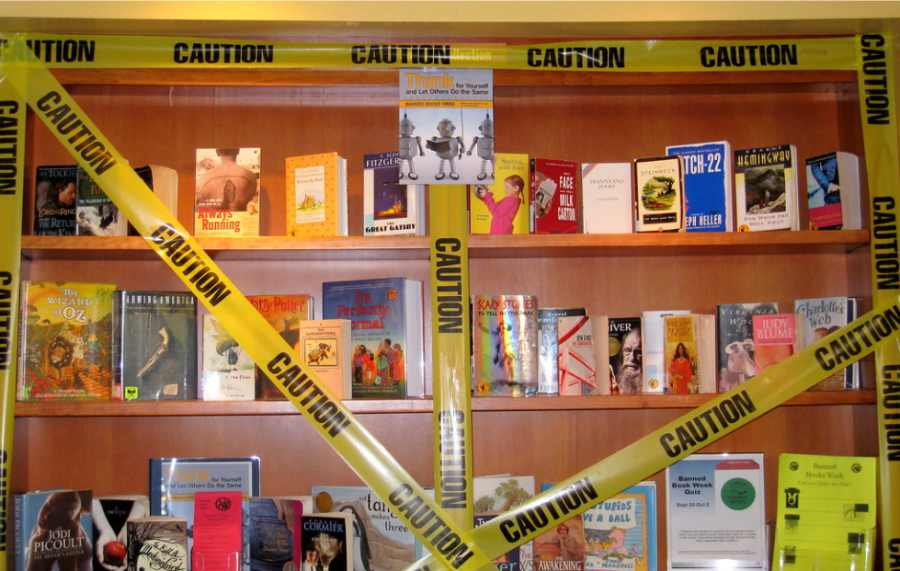Literary Censorship and Book Banning in America
June 14, 2023
Last year, 2,500 books were challenged, double the previous years. This record breaking number has terrorized the jobs and authority of librarians, who continue to be threatened as 32 states have implemented laws censoring the content of books. While many fear the content available for children to read, many others fear the threat against their freedom of speech.
The American Library Association states that banned books have increased by 38% in the last year, 41% of the banned books had LGBTQIA+ topics, 40% of banned books including themes of race. Many of the authors are people of color, members of the LGBTQIA+ community, or both.
Young adult books, those meant for older teenagers, have made up 49% of banned books. Many are troubled by this number because they believe highschool students should be reading books that discuss topics of race and sexual assault as their are at a mature age where they can comprehend and construct their own conclusions about the text. Some find it problematic that 19% of banned books are picture books and 10% of banned books are chapter books, books intended for elementary age students that were questioned due to their alleged inappropriate content.
Books that include content that is deemed to be sexual or intimate have faced persecution. While many find this reasonable, many believe these legislation have gone too far. For instance, The Diary Of Anne Frank has been attacked because Anne discussed her changing body.
While many could presume the majority of banned books are contemporary, literary classics have fallen victim to the new restrictions and laws, Shakespearean literature being one of them. Books that have been a crucial part of curriculums, especially regarding civil rights, such as To Kill a Mockingbird and The Color Purple have been banned in many states as both not only including topics of race but include what can be considered graphic sexual assault scenes.
In Florida, laws have been approved by Governor Ron DeSantis that restrict the conversation of race and gender identity in schools, causing books to be pulled indefinitely. Printz winning novels such as Looking for Alaska and Pulitzer winning novels like The Color of Purple have both been removed. Following Florida’s restrictions, many states including Arizona, Iowa, Texas, Missouri and Oklahoma are in the process of, or have passed bills that have restrictions on books.
In Texas, Llano County has banned an immense amount of books, causing libraries to get rid of all their books as the books had topics of race and/or LGBTQIA+ themes. After a federal judge ordered the return of all the banned books to the public library, shutting the library down completely is being seriously considered.
Parents have the right to know and understand what their children are reading, but measures in Florida have grown. Parents now have the right to complain about a book or text, and it will be removed without serious investigation. This has been seen recently when a parent sent a complaint about Amanda Gorman’s inauguration poem, “The Hill We Climb,” deeming it to not have an educational purpose and including indirect hate. Gorman herself believes for students, literary censorship and book banning is a “violation of their right to free thought and free speech”.
But when one looks at the later released complaint it has inaccuracies and the form itself was not even filled out entirely. When asked what the parent objects about the poem, they are asked to cite a line which was left blank. The complaint complains about poems by Oprah Winfrey and when asked if the parent has saught professional review the parent stated, “I don’t need it”. There was no evidence that displayed the indoctrination the parent claimed the poem had. Now at the K-8 school, Bob Graham Education Center, the book is in the private area of the library that is only for middle schoolers.
Librarians and teachers fear for their careers as they can now face serious consequences for obtaining a banned book. If a book contains one page or a cover that infringes on the legislation, it can and will be removed. Many libraries have begun purging mass amounts of books because they do not want to break the laws. Teachers in states with heaving restrictions have covered up their entire classroom library to avoid violating the law.
While some Americans believe censorship can benefit students, avoids indoctrination, and provides parents their right to their child’s education, there are many Americans and authors who fear their first amendment right. In just one year, from 2021 to 2022, there were 2,532 that were banned, this number has only increased because of the new laws and restrictions this year.
Last year alone, 1,261 different authors have experienced their book(s) being banned. Districts that have experienced book banning have about four million students and have altered what is deemed appropriate for students to read.


